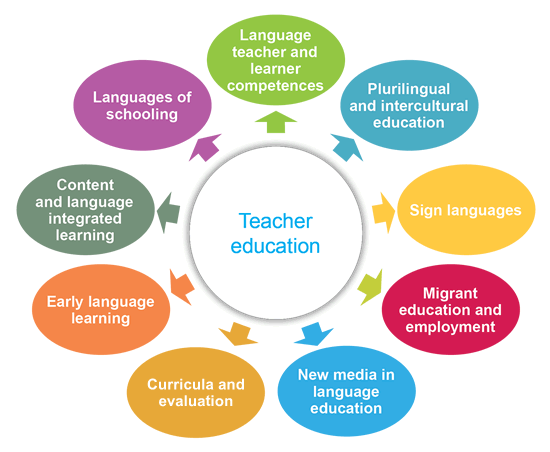Context and Rationale
With a mission to encourage, promote and develop excellence and innovation in language learning and teaching, the European Centre for Modern Languages, an Enlarged Partial Agreement of the Council of Europe, launched its first series of workshops in 1995 under the theme of “modern language learning in the new Europe”. Subsequent activities and 3 and 4-year programmes followed, with the overarching themes reflecting shifting perspectives and new challenges: “languages for social cohesion”; “empowering language professionals”; “learning through languages: promoting inclusive, plurilingual and intercultural education” and, most recently, “languages at the heart of learning”. Since its inception, the work of the ECML has complemented the extensive activity and developments in the field of language policy undertaken by the Council in Strasbourg. It has widened its remit to include not only foreign languages but also regional/minority languages, the languages of schooling and of migration, placing a strong focus on practice. It has acted as a platform and a meeting place for over fifteen thousand language professionals from across its 33 member states and beyond, to share their expertise through workshops, think tanks, network meetings, colloquia and conferences, resulting in a wealth of resources not only for teachers, teacher educators and curriculum developers but also for learners, parents, and policy-makers. A number of these resources have had considerable influence on approaches to language learning and teaching in Europe.
ECML resources are organised under thematic areas, as indicated in Figure 1.

2020 marks an important moment in the centre’s history combining as it does, the centre’s 25th anniversary and the launch of its 6th medium-term programme - a moment when the past meets the present and prepares the future. Against a backdrop of rising populism and in a climate where the founding principles of the Council of Europe – democracy, human rights and the rule of law – cannot always be taken for granted, it seems fitting to use this moment in history to pause and reflect on the centre’s rich activities and outputs over the past 25 years. Such a reflection should be a springboard for creativity, for the creation of completely new resources where a gap can be identified, or for consideration of how existing resources might be combined, adapted and rendered fit-for-purpose to address the current challenges, in an era of global accountability and international standards, of unprecedented and rapid change − geopolitical, economic and technical. All of this places pressure on national education systems as they work to improve the efficiency and effectiveness of language learning and teaching in increasingly multilingual and multicultural classrooms. The ECML, with access to internationally renowned experts in language education, with networks across its member states and beyond, with project formats that bring together up to 100 stakeholders, is in a unique position to address these challenges and influence reform processes.
This Call is the result of a process of dialogue and negotiation which began with an online survey in which ECML member states listed their language education priorities and explained why these were of particular importance. What emerged was also a clear recognition that to realise the goal of quality language education, simultaneous action is required at multiple levels: at organisational level, within curricular and assessment reform processes, as part of teacher professional development (both initial and ongoing), at the level of individual teacher competences and attitudes - each level reviewed through a holistic lens which embraces all languages and responds to the diversity of learners and their individual needs. Moreover, this Call takes cognisance of the views expressed by professionals in the field and of developments at the European Commission. It is clearly situated within the context of wider Council of Europe priorities in education, in particular inclusive approaches to education and education for democratic citizenship, where the development of linguistic and intercultural competences plays a key role.